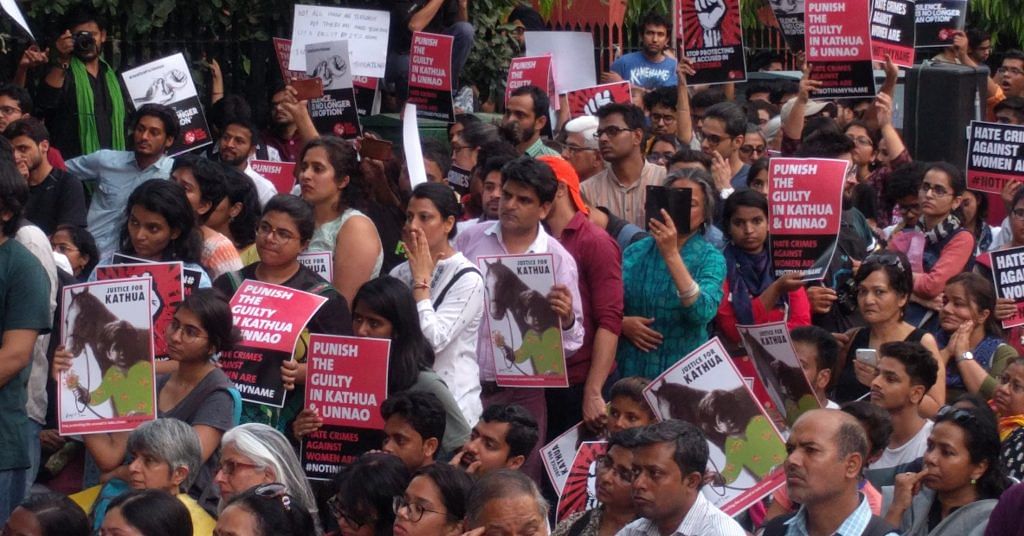My hometown will find it nearly impossible to live down the tag of a place that couldn’t ensure free and fair justice delivery to an 8-year-old victim.
The distance between Kathua in Jammu and Kashmir and Pathankot in Punjab is merely 28.5 km. But after the Supreme Court decided Monday to shift the trial in the Kathua gangrape and murder case to Pathankot, the distance seems huge, and unbridgeable.
There is, in fact, a bridge over a seasonal rivulet that one has to cross to enter Madhopur in Punjab from Lakhanpur on the Kathua side, but the chasm cemented Monday seems like it won’t be bridged anytime soon. Not unless Jammu rises as one and shows that the perception that some of its people support alleged killers and rapists is erroneous. My hometown will find it difficult, if not impossible, to live down the tag of a place that couldn’t ensure free and fair justice to an eight-year-old victim.
Let me begin with a few disclosures. Jammu Bar Association president B.S. Salathia is an old acquaintance, while several people who have been protesting in favour of a CBI probe – which is seen by many as being in support of the alleged rapists and killers of that eight-year-old – are my friends. I even studied law with some of them in Jammu University. I know them to be people who would normally not like to be in this situation.
But, we are living in abnormal times, times where our political thought clouds our power to think rationally, where we choose to see a dead girl not as somebody who must get justice, but as a convenient political tool.
And, lest there be any doubt, J&K chief minister Mehbooba Mufti is as guilty of this charge as her alliance partner, the BJP. In politics, perception is what matters most, and it suits Mehbooba’s agenda to be seen — especially in the Kashmir Valley where she has been losing ground for being an ally of the BJP — as having taken a strong stand against her ally on an issue close to the BJP’s heart.
If it suited the BJP to be seen as supporting the protestors in Kathua – do remember that so far, the party hasn’t denied the charge levelled by ousted minister Lal Singh that he and another minister Chander Prakash Ganga, as well as half a dozen party MLAs, were actually deputed to attend the protest in support of the accused by state unit president Sat Sharma — it also suited Mehbooba to push the line that there was no need for a CBI probe in the case.
Sharma, incidentally, has also been accused of having set up Singh and Ganga as fall guys in the Kathua case because he wanted to become a minister, which he managed to become last week. Do read my colleague Kaveesha Kohli’s timely interview of a BJP MLA where he makes this claim.
More importantly, since I get asked this question very often these days by my friends and others in Jammu — especially after I appeared in an ‘Off-the-Cuff’ with Deepika Singh Rajawat, the young lawyer representing the family of the victim — I didn’t know Rajawat till she attained celebrity status for trying to get justice for the victim. I wish I had met her earlier, under better circumstances, and made her acquaintance.
Jammu, often called the ‘City of Temples’ for having a temple in every other lane, has a tradition of worshipping the girl child. Temples where the reigning deity is a goddess – Kali, Durga, Vaishno Devi, Machail Mata – possibly outnumber those in the name of a male god, like Vishnu or Shiva.
In most homes in Jammu, it is common practice to get five young girls (Kanjaks, we call them), wash their feet, offer them some home-cooked sweets and some cash as ‘offerings’ before undertaking a new venture like starting a business or even buying a new car. In my home, I’m sure in most homes, we never asked if the girl was a Hindu or a Muslim or a Sikh; rich or poor, while inviting Kanjaks.
In a context like this, how could one not be surprised and angry after watching the discourse turn into a bitter argument against a dead girl and the need to get her justice?
The Supreme Court may have shifted the trial to Pathankot, but, as a proud Jammuite, I hope my friends will ensure that the victim gets justice, speedily. And I hope there is no more politics over her dead body.
Otherwise, we would have failed our “Kanjaks”, and no amount of apologies would help us regain my region’s fair name.
